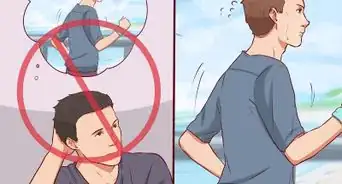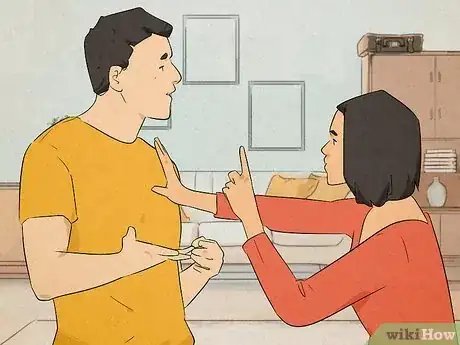This article was written by Jay Reid, LPCC and by wikiHow staff writer, Eric McClure. Jay Reid is a Licensed Professional Clinical Counselor (LPCC) in private practice in San Francisco, CA. He specializes in helping clients who have survived a narcissistic parent or partner. Treatment focuses upon helping clients identify and challenge self-diminishing beliefs as a result of narcissistic abuse. Jay holds a BA in Psychology from the University of Pennsylvania and an MS in Clinical Psychology from Penn State University.
There are 10 references cited in this article, which can be found at the bottom of the page.
This article has been viewed 36,231 times.
If you’ve had enough of a narcissist’s abusive behavior, you may be considering removing them from your life. That’s totally understandable; a persistent narcissist can make you feel like you’re suffocating, and you definitely deserve some fresh air. In this article, we’ll walk you through everything you need to know about cutting ties and moving on. From fast and clean breaks to slow and steady solutions, we’ve got you covered.
This article is based on an interview with our licensed professional clinical counselor, Jay Reid, LPCC. Check out the full interview here.
Steps
Go no contact if you can.
-
You can’t get a narcissist to change, so a total separation is ideal. Block their phone number, block them on social media, and don’t reply to them if they try to reach out. The narcissist may throw a fit or act out in the short term, but they’ll move on quickly once they realize you won’t engage. The other benefit of no contact is that it will give you space to heal and focus on yourself.[1] X Research source
- No contact means absolutely zero contact. Do not agree to meet or chat once you’ve made your decision here.
- If the narcissist is a coworker, family member, or classmate, you may not be able to do this. Alternatively, you may not want to go this far. In either case, it’s okay. We’ll cover other strategies here as well.
- If you are worried for your physical safety, do not hesitate to leave and get help immediately.
Refuse to explain yourself.
-
Do not negotiate or cite evidence—it won’t mean anything to a narcissist. Whether you’re going no contact or opting for a “softer” approach, it’s important to recognize that narcissists don’t have the empathy and perspective that you do. Explaining your problems with them or negotiating terms will get you nowhere, so don’t even bother. Be firm. You got this![2] X Expert Source

Licensed Professional Clinical Counselor Expert Interview. 7 August 2020.- If you opt to ignore them, or they confront you on why you’re acting differently, you might say, “It’s not up for discussion,” or, “I’m sorry, I’d rather not elaborate.”
- If you are going no contact, you can leave them a goodbye letter if you want them to know why this is happening.
Decline every opportunity to see them in person.
-
If you aren’t going no contact, at least refuse to meet up. Narcissists attach themselves to people because they get something out of it. If you can slowly detach from the narcissist, they’ll eventually look elsewhere for validation and attention. Whenever there’s a chance to hang out, find something else to do. If you may run into them with mutual friends, spend the night at home.[3] X Research source
- If they do poke around and ask why you’re avoiding them, you have two options. You can simply play coy like you don’t really know what they’re talking about, or you can “apologize” and say you won’t do it again (but definitely do it again).
Set extremely firm boundaries.
-
A narcissist will eventually give up if you enforce clear boundaries. Boundaries—clear restrictions on what is and isn’t okay—are a narcissist’s worst nightmare. If you want to keep a narcissist around but you want to curb their behavior, simply draw a line in the sand for them.[4] X Expert Source

Licensed Psychologist Expert Interview. 6 September 2018. For each boundary:- Explain where the line is. Do not mince words when you tell them what you will no longer accept. For example, “You cannot tell me how I spend my time and money.”
- Describe the consequence. There must be a clear consequence or else the narcissist will keep at it. You could say, “If you don’t stop, I’m not going to talk to you about what I’m up to.”
- Refuse to back down. Narcissists will push back on boundaries. Don’t let up. You might say, “It’s not up for negotiation. I’m not asking; I’m telling. That’s it.”
- Enforce the boundary. If you don’t follow through, a narcissist will simply think they can ignore your boundary. Stick to your guns!
Ignore them.
-
If you can’t go no contact because you have to be around them, brush them off. You can either outright pretend like they aren’t even there, or simply nod and smile when they talk before getting away as soon as possible. If the narcissist doesn’t get a reaction from you, they’ll eventually stop bothering you and move on to greener pastures.[5] X Research source
- Whether you go totally mute or not depends on how comfortable you are with confrontation. A narcissist won’t respond calmly if you totally ignore them, but it should be fine so long as you’re in a safe, public setting.
Become extremely boring and distant.
-
If you’re not worth spending your time on, the narcissist will get tuckered out. This is known as the “grey rock” strategy. Basically, become as interesting as a boring, old rock you’d find laying by the side of the road. The narcissist won’t bother picking that up. Only respond in writing, if possible, don’t smile at them, keep a straight face when they tell a joke, and don’t hesitate to grunt or throw a “hmm” out there when they talk to you.[6] X Research source
- The trick here is to be really muted, indescriptive, and detached. If the narcissist isn’t getting a whole lot out of you, they’ll become frustrated and start spending their time elsewhere.
Be kind and friendly if they push you.
-
You’ll get zero mileage out of curt back-talk or frustration. When it comes to interacting with a narcissist, they usually want to draw you into verbal combat. If they’re bothering you, just keep it super friendly and don’t let them get to you. By not meeting them on their level, you’ll keep them from feeling vindicated which can get them to let you be.[7] X Research source
- It’s sort of like dealing with a bully. A bully is trying to get you to beg, plead, or throw a punch. By responding in a friendly way, you’ll throw them off their game.
- For example, if they say, “I can’t believe you’re so late. You’re such a slob when it comes to keeping track of time,” you might say, “Yeah, sorry. Totally my bad!”
Drive the narcissist away with radical self-love.
-
If you exude self-confidence and gratitude, you’ll repel their bad vibes. Narcissists are scavengers, and if you don’t look particularly appetizing, they’ll let you be. Focus on you. Pursue things you enjoy, put your time and energy into relationships that aren’t toxic, and continue to chase your dreams. The happier you are about being you, the less likely the narcissist will be to bother you.[8] X Expert Source

Licensed Professional Clinical Counselor Expert Interview. 7 August 2020.- This isn’t to say that you automatically feel bad about who you are if a narcissist is hovering around you. It’s not your fault that this person is being abusive.
Push back on your doubts.
-
Narcissists tend to gaslight people, so don’t give in to any hesitations. Gaslighting is where someone tries to trick another person into doubting their reality. If the narcissist is showering you in criticism and negativity, you may start thinking that you’ve got a problem. You don’t. Push their critiques out of your mind and don’t let them keep you up at night. You’re doing nothing wrong by trying to remove them from your life.[9] X Research source
- If you do need help parsing out whether you’ve made a mistake or not, talk to a close friend or family member whom you trust to get some feedback.
- If you’re tempted to go back, remind yourself why you left in the first place. You might make a list about everything they’ve done to you, or put a note up in your room to remind yourself to stay the course.[10] X Research source
Avoid confronting them.
-
Calling a narcissist out will just let them play the victim card. As tempting (and emotionally rewarding) as it might be to call out a narcissist for their nonsense, it’s not a particularly good strategy when it comes to getting rid of them. Narcissists thrive on conflict, and provoking them will only make you all that more interesting to them.[11] X Research source
- Narcissism is also closely linked to aggressive behavior, so this may even be a dangerous move if you push their buttons too hard.[12] X Research source
Get professional help.
-
If the narcissist is important to you, therapy can help you heal. Making the decision to cull a narcissist from your life can be difficult if they’re a close friend, partner, or family member. Reaching out for help can really help you make sense of this entire thing. Ending things with a narcissist is extremely tough, and there’s no shame in getting some support if you need it.[13] X Expert Source

Licensed Professional Clinical Counselor Expert Interview. 7 August 2020.- You can find a professional therapist near you by connecting with BetterHelp.
You Might Also Like
 How to Shift Reality
How to Shift Reality
 13 Telltale Signs Someone Doesn't Respect You
13 Telltale Signs Someone Doesn't Respect You
 How to Contact Yourself in a Parallel Universe
How to Contact Yourself in a Parallel Universe
 How to Tell If Your Girlfriend Is Toxic
How to Tell If Your Girlfriend Is Toxic


 How to Use the Raven Method (Reality Shifting)
How to Use the Raven Method (Reality Shifting)




 How to Escape the Simulation: What Is the Simulation Hypothesis and More
How to Escape the Simulation: What Is the Simulation Hypothesis and More


References
- ↑ https://www.psychologytoday.com/us/blog/toxic-relationships/202103/why-narcissists-and-abusers-wont-let-go-and-what-you-can-do
- ↑ Jay Reid, LPCC. Licensed Professional Clinical Counselor. Expert Interview. 7 August 2020.
- ↑ https://www.psychologytoday.com/us/blog/understanding-narcissism/202103/how-narcissists-use-faking-lure-partners
- ↑ Liana Georgoulis, PsyD. Licensed Psychologist. Expert Interview. 6 September 2018.
- ↑ https://www.psychologytoday.com/us/blog/the-legacy-distorted-love/201610/8-tips-protect-yourself-narcissist
- ↑ https://www.psychologytoday.com/us/blog/toxic-relationships/202103/why-narcissists-and-abusers-wont-let-go-and-what-you-can-do
- ↑ https://psychcentral.com/blog/psychology-self/2018/08/narcissist-arguing#6
- ↑ Jay Reid, LPCC. Licensed Professional Clinical Counselor. Expert Interview. 7 August 2020.
- ↑ https://cbtpsychology.com/survive-narcissistic-father/
- ↑ https://psychcentral.com/blog/how-to-stop-going-back-to-an-abusive-relationship#how-to-stop-going-back
- ↑ https://www.psychologytoday.com/us/blog/fulfillment-any-age/201805/is-what-narcissists-thrive
- ↑ https://news.osu.edu/narcissism-linked-to-aggression-in-review-of-437-studies/
- ↑ Jay Reid, LPCC. Licensed Professional Clinical Counselor. Expert Interview. 7 August 2020.
























































Medical Disclaimer
The content of this article is not intended to be a substitute for professional medical advice, examination, diagnosis, or treatment. You should always contact your doctor or other qualified healthcare professional before starting, changing, or stopping any kind of health treatment.
Read More...